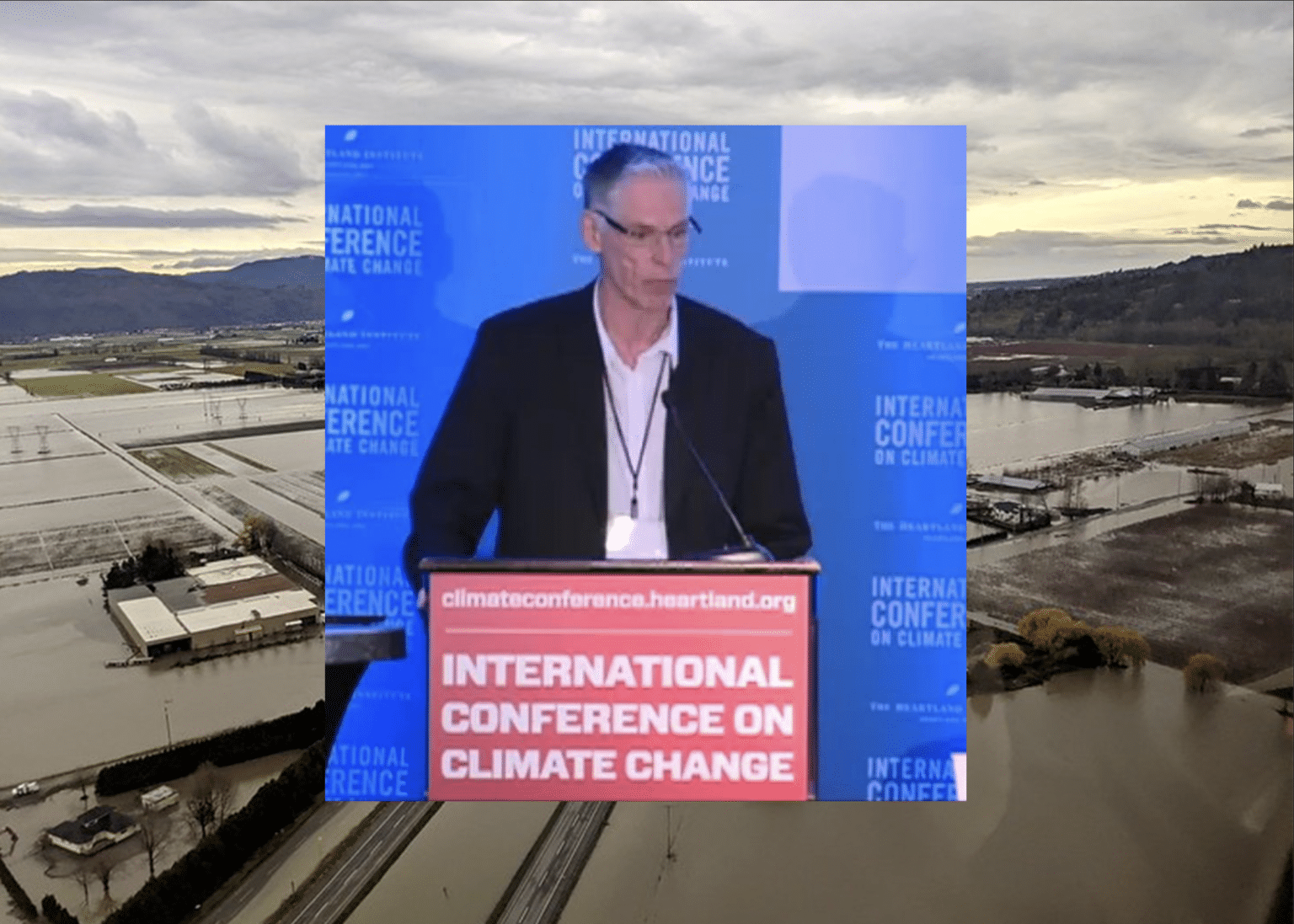A University of Victoria economics professor who has spent years questioning whether global warming is “a real thing” is doing research supported by hundreds of thousands of dollars in funding from the Canadian government.
Gerrit Cornelis van Kooten holds the prestigious title of Canada Research Chair in Environmental Studies and Climate Change, a distinction reserved for “outstanding researchers acknowledged by their peers as world leaders in their fields.”
But as recently as 2018, van Kooten was publicly supporting a fringe scientific argument claiming “It is quite likely that future generations will benefit from the enrichment of Earth’s atmosphere with more carbon dioxide.” Last December, he authored a blog post entitled, “‘Renewable’ energy can’t replace fossil fuels,” which made the scientifically dubious claim that toxic chemicals contained in solar panels “are several orders of magnitude more hazardous than nuclear waste.”
Meanwhile his peers are producing leading-edge research about climate change. Several University of Victoria researchers recently released a paper calculating that the deadly atmospheric river which caused floods and landslides in southwestern B.C. last November was potentially made 60 percent more likely due to global warming.
Van Kooten has spent years denying that human activities are warming the planet. Yet van Kooten is a “Tier 1 Chair,” meaning that his research on climate change and the environment qualifies the University of Victoria to receive $200,000 annually for seven years.
He is currently serving his second term as Canada Research Chair. In order for his 2016 renewal to succeed, he had to demonstrate to a review board of three experts that his work is “producing lead-edge results that are making a significant impact at the international level.”
This is a “rigorous peer review process,” a spokesperson for the Social Sciences and Humanities Research Council of Canada told DeSmog in an email. “Consequently, each Chairholder is expected to strive to follow best research practices honestly, accountably, openly, and fairly.”
Van Kooten says his research into the economic impacts of lowering greenhouse gas emissions provides a much-needed perspective for decision-makers. “Climate science often ignores economic considerations, and climate models do not usually include interactive economic sectors, making it difficult to explore cost-effective policy responses to climate change and its consequences,” he writes in his program bio. Van Kooten said he was unavailable for an interview with DeSmog. “Unfortunately, I am totally bogged down with teaching,” he wrote in an email.
It’s not clear from his public statements that he views global warming as a serious threat.
In 2015, the University of Victoria professor spoke at a conference in Washington, D.C., organized by the Heartland Institute, a group that’s received over $1 million in contributions from Exxon, Koch Industries and the coal company Murray Energy. The Heartland Institute has previously led campaigns seeking to “cast doubt on the scientific finding that fossil fuel emissions endanger the long-term welfare of the planet,” according to leaked documents from the organization.
“Thank you to the Heartland Institute for paying my way here,” van Kooten said at the 2015 conference, where he identified himself as a Canada Research Chair. “Even if nations conclude an agreement to reduce CO2 emissions, it will cost a lot of money but have no perceptible impact whatsoever on atmospheric CO2 concentrations and global warming — if it’s a real thing.”
In 2018, van Kooten was one of dozens of academics who signed his name to an open letter defending Rebekah Mercer — the daughter of far-right billionaire Robert Mercer — who served on Donald Trump’s transition team and has directed millions of dollars through her family foundation to organizations that dispute the science of climate change.
“The case for harm from catastrophic global warming is growing weaker as more is learned about the Earth’s climate system,” reads the letter signed by van Kooten, who is again identified as a Canada Research Chair.
“Climate denial is pretty shaky ground upon which to be basing your work.”
Gretchen Fitzgerald, Sierra Club Canada Foundation
While Canada Research Chair, van Kooten has headed a research group at the University of Victoria titled Resource Economics & Policy Analysis that releases regular working papers related to climate change, economics, forestry, and agriculture. In these papers, van Kooten has claimed, “There is a great deal of uncertainty concerning climate change,” while citing Canadian climate change skeptic Ross McKitrick and George Mason University research fellow Patrick Michaels from the U.S.
Among multiple other examples, he has suggested, “[T]here is no straightforward causal link between human fossil fuel use and temperatures, although this remains an area of contention,” again citing himself and Ross McKitrick.
McKitrick and van Kooten both endorsed the “Evangelical Declaration on Global Warming,” a document created by the Cornwall Alliance, an evangelical Christian group that claims: “There is no convincing scientific evidence that human contribution to greenhouse gases is causing dangerous global warming.” Van Kooten remains a senior fellow with the Cornwall Alliance.
The Canadian federal government encourages researchers to use their title publicly.
“By making a conscious and continuous effort to use your Canada Research Chair title, you are spotlighting your status as a researcher of excellence,” a federal website about the program explains. “By doing this, you elevate both your reputation as a world-class researcher and the value of the Canada Research Chairs Program.”
The professor recently acknowledged that global temperature rise is happening, writing in a 2021 paper for a conservative think tank known as the Fraser Institute that “climate change is impacted by global emissions of greenhouse gases.” But in a Calgary Sun op-ed drawing from that paper, van Kooten argued that transitioning away from fossil fuels, the primary source of global warming, would be expensive and ineffective.
“Canadians should understand that at the very least the forced transition to renewables will impose real costs in the form of higher energy bills. Simply put, there’s no free lunch when it comes to forced energy transitions,” he wrote.
This is a textbook example of a strategy known as “climate delay”, argues Matto Mildenberger, a Canadian researcher who studies climate disinformation as an assistant professor of political science at the University of California, Santa Barbara.
“Rather than rejecting the scientific consensus on climate change, there’s been a systematic effort to amplify the costs associated with taking action,” he told DeSmog. “Basically doing everything possible to make taking action on climate change seem less and less appealing to the government and the public.”
“The result is we continue burning fossil fuels and releasing carbon pollution,” he said.
The federal minister responsible for the Canada Research Chairs program says fighting the climate emergency is a top research priority. The Canadian economy “has to be greener, more innovative and has to provide breakthrough solutions – and I want Canada to be at the forefront of these solutions,” Minister of Innovation, Science, and Industry François-Philippe Champagne said last November.
It’s hard to see how spreading misinformation about climate change fits that goal, yet some climate activists stop short of saying van Kooten should stop receiving a prestigious public platform for his views.
“I think we have to be very careful about attempting to control independent research and free debate,” Gretchen Fitzgerald, national program director for the Sierra Club Canada Foundation, told DeSmog. “All that said … it does seem to me that climate denial is pretty shaky ground upon which to be basing your work.”
Mildenberger agrees that publicly supported researchers should be under no obligation to please their funders.
“I certainly don’t think that people need to do research that conforms with what the government wants them to be studying,” he said, but as to using a public platform to offer misinformation, “to me that violates the spirit and nature of what a researcher is.”
Subscribe to our newsletter
Stay up to date with DeSmog news and alerts






